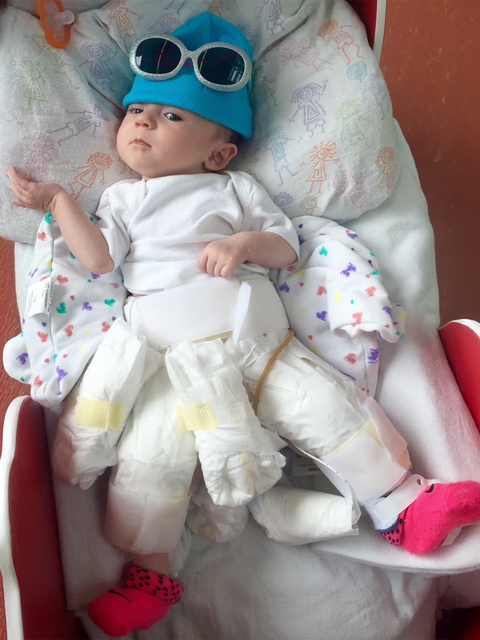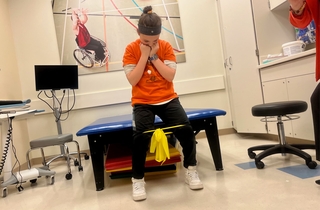How a Team Approach to Pelvic Health Helped Lilly Heal and Grow
How a Team Approach to Pelvic Health Helped Lilly Heal and Grow

Lilly was diagnosed with bladder exstrophy while she was still in the womb. From there, her parents entered a world they never expected, full of uncertainty, surgeries and specialists. But nearly a decade later, Lilly is a confident 9-year-old who is thriving and showing others how to be stronger through her example. Our team approach to surgery and subsequent pelvic health care here at Children’s Hospital of Philadelphia (CHOP), has been a big part of Lilly’s journey to healing.
Diagnosis and delivery
During a routine pregnancy scan, Lilly’s mother, Lauren, was first told her baby might have a rare disorder called bladder exstrophy where their abdominal wall had not fully formed while the baby was growing in utero. This meant her baby’s bladder and urethra had not closed completely and they might have trouble storing and releasing urine after birth.
Because her doctors were not 100% certain, Lauren’s care team referred her to CHOP for further evaluation and to confirm the diagnosis. Lauren and her husband were nervous and confused at first about what this would mean for their baby’s health. But once they arrived at CHOP, everything changed.
“As soon as we walked into CHOP, I knew this was where we needed to be,” Lauren recalls. “They made it almost impossible for me to worry, because everyone was just so confident and encouraging.”
Lauren continued her weekly maternal care visits at CHOP, and Lilly was delivered in our Garbose Family Special Delivery Unit (SDU), designed for babies who need immediate medical care after birth. The treatment for bladder exstrophy includes surgery to repair the organs involved, so Lilly was then treated through our Bladder Exstrophy Program.
The program’s long-term goals for children with exstrophy are:
- to make sure they can hold and release their urine both during the day and at night (daytime and nighttime urinary control)
- to preserve healthy kidney function
- to improve the appearance and function of their visible reproductive parts
At two months old, when she was strong enough, Lilly had her repair surgery and remained inpatient at CHOP for six weeks.
“I stayed in the hospital dorms at first; then later I started going home at night and coming back during the day,” says Lauren. “The staff were amazing — they let me do so much of her care while we were there, so I felt really prepared once we went home.”
Continuing surgery and care
Lilly’s care continued to evolve over the years. Her surgery had some unexpected challenges and ultimately her urine was not draining well, so she had to have a surgery to divert her bladder again in order to stop getting infections. While Lilly did not follow the planned routine post-operative course and she underwent more surgeries to keep her kidneys safe while she grew, she kept a great attitude.
During the course of Lilly’s care, it was thought that her bladder would need to be diverted permanently and that she would have to use a tube (catheter) to empty her bladder when she got older. She had behavioral health therapy sessions through the Urology clinic as part of her follow-up care to help her manage the emotional effects of living with an ongoing (chronic) medical condition.
Lauren shared, “There’s been a lot of frustration with so many things being done, and not always getting the results we hoped for. But Lilly has always handled it with such grace. Even when she’s annoyed or tired of it all, you wouldn’t know unless she told you.”
An unexpected breakthrough

One of the biggest milestones in Lilly’s journey came when her care team, led by pediatric urologist Dana A. Weiss, MD, discovered an unexpected way to access her urethra during the procedure to divert her bladder. It was a breakthrough that changed the course of her care.
Because of Dr. Weiss’s diligence in looking for ways to improve Lilly’s condition, Lilly began releasing urine through her urethra. This was something her family thought she might never do, expecting she might need to use a catheter for the rest of her life. Instead, rather than performing a big surgery, Lilly’s care team set on a path of intensive physical therapy to see if she could develop muscles to control her bladder.
Soon after, Lilly began physical therapy for pelvic health with Sarah Cooper, PT, DPT. Paired with the surgery and reconstruction approach, CHOP’s extensive physical therapy program has helped children around the world with exstrophy have better health outcomes.
For Lilly’s family, it’s been a critical part of her progress. They’ve felt Sarah’s knowledge about both bladder and pelvic floor health has been invaluable, and she connected with Lilly in a way that made Lilly feel understood. Lilly loves going to therapy. Lauren says, “Sarah quickly picked up on Lilly’s personality: straightforward, determined and playful. They have fun banter. Sarah gets her and that’s made all the difference.”
A black belt in determination

Now 9 years old, Lilly is training for her black belt in Tae Kwon Do. She teaches younger students at her dojo and holds herself to high standards.
“She doesn’t want handouts or modifications. She wants to do everything just like everyone else — actually, better than everyone else,” her mom says with a laugh. “She’s motivated, she’s a leader, and I can totally see her being someone who lifts others up.”
Lilly’s family is immensely proud of how far she’s come, and excited for what’s ahead.
Advice for other families
Like many families facing a rare diagnosis, Lilly’s parents found comfort and knowledge in connecting with others through a bladder exstrophy support group on Facebook. “You learn a lot from other parents — things even the hospital staff can’t always know, because they’re not with you day-to-day once you leave,” says Lauren.
For parents navigating their own child’s recovery, she offers simple advice: “If you think your child needs something, like physical therapy, keep asking until someone says yes.”